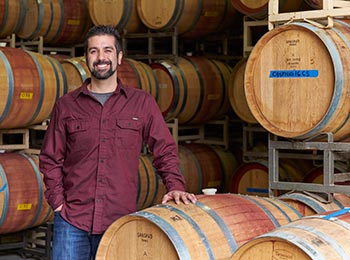An interview with Chris of Castillo de Feliciana vineyard and winery by Alberto Robles-Ramos
Christopher Castillo is the proud owner of Castillo Winery. He works at his winery, being the head winemaker there. A few things we talked about in this interview are Chris’s experiences in the wine industry as well as his thoughts on climate change.

Alberto Robles: How did you get into wine?
Christopher Castillo: Wine has always been an integral part of my life. My mother and father are both wine lovers, and wine was always on the dinner table. I learned an appreciation for wine through them, including modesty and responsible consumption. My father was also a hobby winemaker, and had the whole family involved in the process, from grape stomping to tasting the final product.
My first start in the beverage manufacturing business was commercial brewing. I worked in the cellars for a handful of years before finally producing beer as a brewer for Mac & Jack’s Brewing Company in Redmond, WA. I was thirsty for a change, so making wine seemed like a natural progression. I made the decision to enroll in the EV program and learn how to make wine in the Walla Walla Valley with Ryan Raber (former winemaker for Tertulia Cellars), whom headed my family’s winery production beginning in 2007. After harvest of 2010, Ryan accepted a position as Winemaker for Tertulia Cellars, and left the door open for me. I have been making wine for my family since the 2011 harvest.
AR: Is there someone in the EV world that you admire, including fellow EV alums?
CC: It takes true grit to be a winemaker, and if there is one person that embodies that it is my former instructor Timothy Donahue. True blue, honest, intelligent, hard-working, and extremely dedicated to his craft. To me, he embodies what it takes to succeed in the wine business.
AR: What’s special to you about working in the wine industry?
CC: It’s special to be a part of an age-old tradition (making wine), that humans have engaged in since 6000BC (according to the researchers at National Geographic). It might sound odd, but I feel a connection to our ancestors. What an incredible opportunity this all is.
AR: What is your favorite part of your job?
CC: Harvest happens but once a year, and I love the intensity of the season. While stressful and exhausting, I find pleasure in seeing how hard I can go, how much stronger I can be. Everyday your senses are overloaded with smell, taste, and visuals (color). Remaining hyper focused on producing quality wine during long, laborious hours on your feet keeps me in the present moment, and it can be a great feeling.
AR: What are some of the challenges you’ve faced in the industry?
CC: Being a winemaker is nothing but challeges! Problems arise often and you have to be solution minded to stay grounded. Equipment malfunctions during harvest? Yes. Stuck fermentations? Indeed (although not that often). Shipping delays with glass/labels/corks and you might miss your bottling deadline? Its happened too many times. The best way to mitigate these challenges is to stay organized and always be one step ahead in your process. With so many wineries in this area there is value in reaching out to others for support. Lots of great leaders in our area willing to help.
AR: What do you think differentiates and excites you about Washington wine?
CC: Pacific NW wine growers and makers operate in climactic extremes, and I believe it shows in the wine. The grapes are succumbed to environmental stress (bitter cold winters, extreme heat in the summer) which I like to think is necessary for flavorful wine grapes. There is this balance of textures, acids, and phenolic ripeness that really excites me about Washington wine.
AR: How do you foresee climate change or social issues affecting the local industry in the next few years?
CC: Climate change is the one thing that has a grip on all of us in the industry. While we can grow outstanding crops of grapes currently, 20 years from now could be an entirely different story. Not only that, we are seeing presently how extreme weather throughout the season affects the quality of our grapes. Dry, extremely hot summers lead to wildfires and smoke, tainting our grapes. As the climate changes, so will our vintages of wines. It’s also only a matter of time until phylloxera starts inundating our soils (its already happening!), forcing growers to replant on resistant rootstock (expensive and time consuming). These are some of the few challenges ahead of us, due to the changing climate.
AR: What are some up-and-coming trends in wine that you’re following?
CC: Sparkling (white) wine. Whether Traditional Method, or force carbing, consumers are loving the fizzy nature of these refreshing wines. We’ve been making Traditional Method Sparkling wine since 2011, originally from Chardonnay and now from Albariño. We have named it “Brillánte”. Our vintages keep selling out before we can release the next batch, so its indeed growing in popularity.
AR: What advice can you share with future EV graduates?
CC: Pay attention to detail, work hard, and listen. Know who your leaders are, and also know when it’s appropriate to lead others.


Join the Conversation